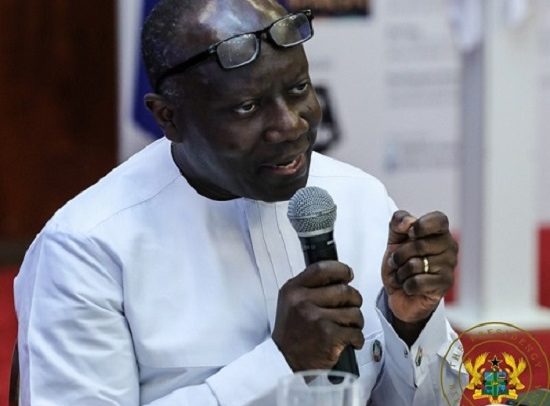Ken Ofori-Atta
The World Bank is urging the Government of Ghana to give a boost to the country’s production capacity to deal with the continued rising inflation rate.
This is because a good production capacity would help speed up the country’s recovery process from the impact of the COVID-19 pandemic, contribute to economic stability and protect the livelihood of the poor.
World Bank country director, Pierre Frank Laporte, noted that the pandemic, together with the slowdown in advanced economies, which affected the oil demand globally, had a major supply shock that drove down growth recorded in 2020.
The situation, he said, required that: “Ghana boosts its health systems and social safety nets by boosting the production capacity of the economy, which is the most sustainable way of dealing with inflation.”
Pierre Frank Laporte was speaking at the opening of the University of Ghana (UG) Annual New Year School and Conference in Accra on Tuesday (January 25).
Laporte noted that before the COVID pandemic, Ghana was growing at a fast pace, however, economic activities almost came to a halt, due mostly to restrictions to trade and normal economic activities because of lockdowns and other containment measures.
Again, the country missed its inflation target of 8%, and recorded a 12.6% inflation at the end of the 2021 fiscal year, something, Laporte said, was not good for the economy’s recovery.
“As you know, inflation in Ghana has exceeded the central bank’s target since October last year [2021], largely driven by global inflation, and there are many reasons to be concerned,” he said.
The country director observed that inflation was a terrible thing for the economy, especially, for the poor, and that dealing with inflation through monetary policy required “tightening”, which was also costly because it increased the price of credit for firms and the government.
He also noted that: “the public debt rising from 60% of gross domestic product (GDP) in 2019 to the high 70s in late 2021 as a result of the higher cost of debt servicing, was unavoidable.”
Nonetheless, Laporte, said, there was the need to “lay out a road map for returning to a state of equilibrium that would be credible, which means that we require efforts not only from creditors, but also from tax-payers, and beneficiaries of government spending.”
He promised that the World Bank would continue to support the country in its pathway to recovery and resilience through analytical work on debt, revenue mobilization, and construction of financing.
President Nana Addo Dankwa Akufo-Addo, who opened the program, noted that the Government had taken steps to consolidate gains made and enhance the living standards of Ghanaians.
“The proactive decisions taken by Government to fight the pandemic as well as revitalizing and transforming the economy with GHC100 billion Ghana CARES program to create jobs and prosperity for Ghanaians have begun yielding results,” he said.
He added that processes to integrate all systems to establish a common source of information would help in mining insightful data to drive improvements in domestic revenue mobilization and help implement targeted social programs to enhance the living standards of the citizens.
Since its inception in 1948, the Annual New Year School and Conference has been the flagship program of the University of Ghana, Legon, and attracts people of all walks of life to deliberate on topical issues of national and international interest.
It opens at the beginning of the year and the end of every School and Conference, a communique is issued, which captures the recommendations of participants and discussants and informs policy decisions and directions in the country.
This year’s conference is on the theme, “COVID-19 and socioeconomic dynamics in Ghana.”


